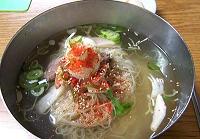
Download For many South Koreans the best way to beat the summer’s heat is a bowl of cold noodles.
Naengmyeon, as its known, was originally a popular winter dish from North Korea, but was brought south by refugees during the Korean War.
These days, more recent defectors have started opening up their own restaurants that specialize in naengmyeon and other culinary staples from back home. And some of them say food can help bridge the gap between the two Koreas.
From Seoul, reporter Jason Strother has the story.
The menu at this tiny restaurant takes you on a gastronomical tour of North Korea.
There’s dumpling soup from Kaeseong, a rice and beef dish from Pyongyang and naengmyeon from Hamhung.
That last item is what many customers come for.
I'm here with my friend Rho Soo-ah. She says naengmyeon is just what you want on a steamy summer day.
“When it’s really hot, it’s just really refreshing and it tastes good it kinda cools down your whole body.”
Rho orders one bowl of naengmyeon served in a cold beef broth, another mixed with raw fish and pepper sauce.
All the staff at Ryu Kyung-ok are North Korean defectors, including the owner, Ahn Mi-ok,
“North Korean food is really simple compared to South Korean food. We use the traditional ways of cooking and don’t add unnecessary ingredients. Here they use too many artificial flavorings or add extra types of sauces. North Korean food goes back to the basics.”
While naengmyeon has been popular in South Korea for decades, Ahn hopes other North Korean dishes will soon catch on.
47-year old Lee Aeran is also counting on that. Lee is a former food inspector from Pyongyang. She now runs the North Korean Food Institute in Seoul.
“The problem is that North and South Korean people have had no communication since we were separated. But our love of food is universal. Cooking provides a place for both of us to come together and chat over cooking or eating and talk about food.”
Recently, Lee’s school started offering classes in English, so non-Korean speakers can talk about North Korean food too.
With the help of an interpreter, Lee instructs the class on how to make Haeju Bimbinbap, a North Korean rice and vegetable dish that’s made with chicken and soy sauce.
27-year old, Korean-American Alex Jung stands over a simmering pot. He says the class taught him some new things about Korean food.
“I think that I am pretty familiar with South Korean cooking in general and all the regional differences within South Korea. And there definitely aren’t that many opportunities to try, eat or make North Korean food. And I was just excited to learn about a certain style of North Korean food that I had never eaten before.”
Lee Aeran says her cooking school also has a special meaning for North Korean defectors who didn’t have much to eat back home.
“Many people in North Korea really can't eat well, they struggle because of the food shortages there. They can’t have proper meals and often just have rice mixed with water.”
And often, there wasn’t even enough rice, says 41-year old Seong Yuri. She’s a student at the cooking school and says that since she came to the south in 2007, she’s learned a lot about food from her homeland.
“We didn’t have the ingredients to make these types of dishes back home, but now here in South Korea, I have finally am able to learn how to make North Korean food. I really didn’t know much about this type of cooking until I came here.”
But Seong says what she really learned when she came here was how differently North and South Koreans appreciate food.
“I was really surprised that many people here go on diet. In North Korea we are starving to death but here they want to be slim. I think there’s actually too much food here and it’s hard to choose what to eat, there is so much diversity. But, I have gotten to try a lot of other countries’ food.”
Seong says that despite those differences, she too believes learning about each other’s food can bring the two Koreas closer together. Reunification, she says, starts at the dinner table.













